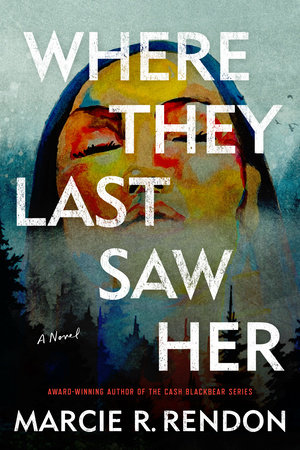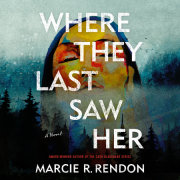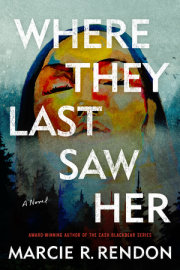Chapter OneQuill ran the snow-covered trail. In her right hand she carried bear spray and in the left she carried a long stick to ward off the rez dogs that often ran in wild packs. Her breath formed frozen clouds of white air that drifted back over her shoulder. Winter brought its own deep silence to the woods. Dead leaves from the poplar trees and dropped twigs sodden with fall moisture were frozen under the recent snowfall. They didn’t crackle and crunch under her running shoes. While the pines were still lush, the deciduous trees had no foliage to rustle. The winter-dead underbrush, bare of leaves, made it possible to see a hundred yards in either direction. The winter forest wasn’t as dark and lonely as the summer forest could be.
Quill had run Duluth’s 26.2-mile Grandma’s Marathon the previous June, and after that run she had become determined to train every day all year round to prepare for the Boston Marathon, if not this year, then the next.
Out of the corner of her eye Quill spied a rabbit, rusty brown in color, sitting not three feet off the trail. A cottontail. The cottontail stared without blinking or twitching a nose or ear—its survival instinct. Quill kept running. She saw a horned owl sleeping in a tree. Surrounded by forest, the bird’s natural habitat, Quill mainly ignored the superstitious fear of owls—the fear that said hearing or seeing one meant death. A lone sparrow quietly hopped from one tree branch to another. Quill ran. Breath in. Breath out. Acutely aware of the life in the trees around her, hitting her stride where she barely felt her feet touch the ground.
Deep in a meditative runner’s trance, Quill instinctively dropped to her knees and swiveled around, looking in wideeyed terror in all directions, as a high-pitched scream pierced the air. The scream did not repeat. Quill crab-walked to a large jack pine and sat on the cold ground, her back on the tree, pepper spray and stick ready to attack.
Why did you wear the neon-pink running suit, fool? she thought as she scanned the forest around her, noticing that both pink knees were dirty from the forest floor. She slid around the tree and scanned the forest in all directions. The forest was even more silent than it had been. Every living creature and plant went to hush with that scream.
It was a woman’s scream; I swear to god. When the scream didn’t repeat, Quill scooted around to the trail side of the tree and quickly scanned up and down the trail. No one else was on it. Quill crouched, keeping her back to the tree trunk. Nothing moved in any direction. She pulled her winter cap off, tilted her head as if that would help her right ear hear better. She was sure the scream came from the right because when she dropped to the ground, she instinctively turned to the right first.
Quill felt a chill down her back. The chill that happens when folks say,
Someone walked over my grave. She checked her watch. When she’d decided to train for the Boston Marathon, she’d splurged and bought herself a running watch. Her friends teased her about being bougie and getting a “white runner’s” watch. But it told her the time, with a GPS system, heart and oxygen status, and music, and told her how many miles she ran. Now it told her her heart was beating way above normal at two-fifteen in the afternoon and that she was three miles into the woods, which meant three miles back to the gravel road everyone called Cemetery Road, where her car sat. And another fifteen miles of reservation road to get back home. She glanced in all directions, cautiously took her time to raise herself to a full standing position, and took off running to her car.
Copyright © 2024 by Marcie R. Rendon. All rights reserved. No part of this excerpt may be reproduced or reprinted without permission in writing from the publisher.






